Every summer, MEDEX Northwest welcomes its incoming class to its physician assistant education program. Students from all four sites—Seattle, Spokane, Tacoma, and Anchorage—converge on the University of Washington campus in Seattle for six weeks of instruction and bonding before they go to their separate sites for the remainder of the academic year.
They’ve all been working their online Anatomy & Physiology course since March. But July 1st, 2019 was the first time these 132 students came together under one roof at the UW campus. There was a rush of excitement as the individuals collected their information packets and took their seats in the auditorium for Day 1 Orientation.
The mean age of the class overall is 30 years old. For many, this is the start of their second or third career. Consequently, they come to MEDEX with an average of 4 years’ experience in the medical field. 41.7% are men and 58.3% are women, and 22% identify as students of color. Over 12% have been in military service, and 78% are from the WWAMI Region that is comprised of Washington, Wyoming, Alaska, Montana, and Idaho.
Program Director Terry Scott, MPA, PA-C, DFAAPA, addressed the new students with a reference to the program’s legacy.
“Fifty years ago, Dr. Richard Smith began the MEDEX program in response to the need for primary care services. 2,600 other individuals have taken a similar journey as you are about to embark upon. They’ve gone on to serve the citizens of this region, this country, and the world.”
“While you had many educational opportunities to choose from to become a PA, we believe you chose us and we chose one another not just because of the convenient location in the WWAMI region, but because of the quality education you’re going to receive here at MEDEX. We also think we chose one another because the MEDEX mission resonates with you. We’re not a program that looks at your application and says, ‘Here’s someone who looks really good on paper, let’s just put them in.’ Many programs do that. We don’t. We are a mission-driven program. We look and ask questions of you to get a sense of your core values, your purpose for being. Does our mission and your values synch? We think that they do and that is what has brought us together. And now the hard work of helping you to become a physician assistant begins.”
“This is a very large program,” said the program’s senior medical director, Tim Evans, MD, Ph.D., FACP. “There are a lot of you, and there’s a huge faculty and staff. Altogether there are 65 or 66 of us between all four campuses. Every single one of us is here because of you. If it weren’t for you, none of us would have these jobs. We have only one purpose in our work life, and that’s to get you through this program and turn you out of here as outstanding physician assistants. Everything we do is to get you where you want to go.”
Dr. Evans continued: “There are a lot of reasons for you to give this everything you’ve got. Over the next 2+ years, you have one job: to learn how to be a PA, to learn everything you can about medicine. So, when you get out of here, first of all, you can pass the certifying exam so you can get a license to practice medicine. And after that, so you provide excellent medical care to your fellow citizens. They are depending on you. When you walk in that exam room they just assume that you are an outstanding medical practitioner, and it’s our job to make sure that assumption is well-founded.”
Meet Our Students
We want to share some short profiles of a handful of our incoming students who meet the requirements for mission fit. They are but a sampling of the 132 individuals who are in deep for the next two years. We believe they are representative of the character of MEDEX students in many ways.
Anchorage Class 11
Caitlin Richardson – Anchorage Class 11
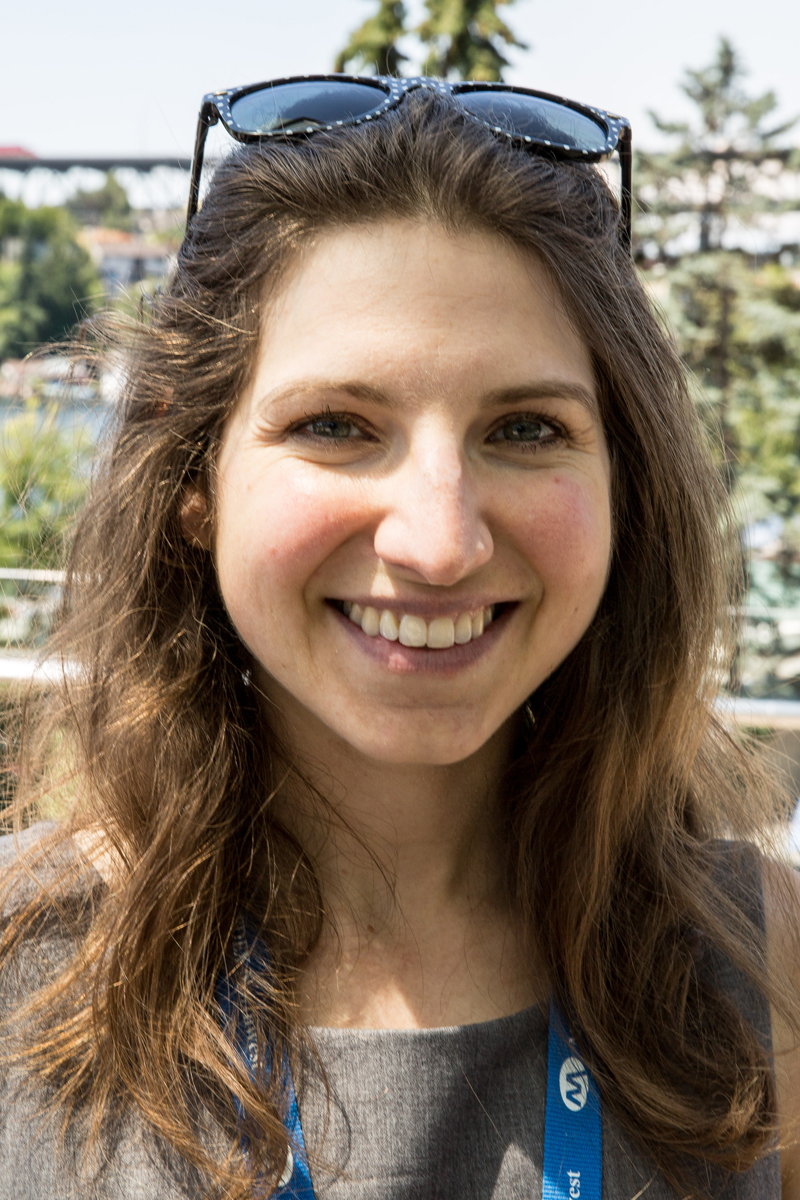
Born in Kaiserslautern, Germany to a German mother and an American father, Caitlin Richardson found her way to Alaska with her US serviceman husband. “He was in the US military,” she tells us. “We both came to Alaska and realized, ‘This isn’t working.’ We went separate ways. I decided to stay in Alaska because this is where my heart lies.”
Caitlin comes to MEDEX with a bachelor’s degree in Medical Lab Science from the University of Alaska Anchorage. She’s been practicing as a medical lab scientist for five years. For the past three of those years, she’s been working in a small critical access 11-bed hospital in the town of Valdez in rural Alaska, population 3,862. A commercial fishing port and freight terminal, Valdez was the site of the disastrous Exxon oil spill in 1989.
As a medical lab tech in Valdez, Caitlin became the Jack of all trades.
“I was able to follow my lab specimens from collection all the way through analysis. And then I was also able to consult with the doctors regarding lab results and help form a diagnosis. I really enjoyed that portion of the job, being able to put that diagnostic puzzle together and interact closely with the patients.”
Normally, this kind of diagnostic input and patient interaction isn’t part of the job description for a medical lab tech.
“In Valdez, Alaska, this was part of my scope,” she says. “Because we are so isolated and we have a lack of resources, sometimes we must wear a lot of hats. And that’s not just me working in the lab. That’s all of us.”
The challenges of medicine in rural Alaska are lack of resources and inclement weather.
“We’d get patients that were critically injured and we’d have to fly them out,” she says. “Sometimes we wouldn’t be able to medivac them because of a blizzard, avalanche, or high winds. Then we’d provide medical services to these critical patients that should be seen in a trauma facility. I really liked that aspect of the job, being flexible to take that challenge and be on your toes.”
For Caitlin, her decision to become a physician assistant combines the best of both worlds.
“Rural Alaskan providers work in primary care where they get to follow their patients through all aspects of their medical journey. But they also staff the emergency room where they are able to be at the patient’s bedside when they’re at their worst.”
Upon graduation and certification, Caitlin is determined to remain in Alaska. “Maybe not Valdez, but I do see myself working in rural medicine, absolutely.”
In the meantime, she entreats other PAs to give rural Alaska a try. “I’m happy I did, and there is a huge staffing issue across the state.”
John “Jack” McCrary—Anchorage Class 11
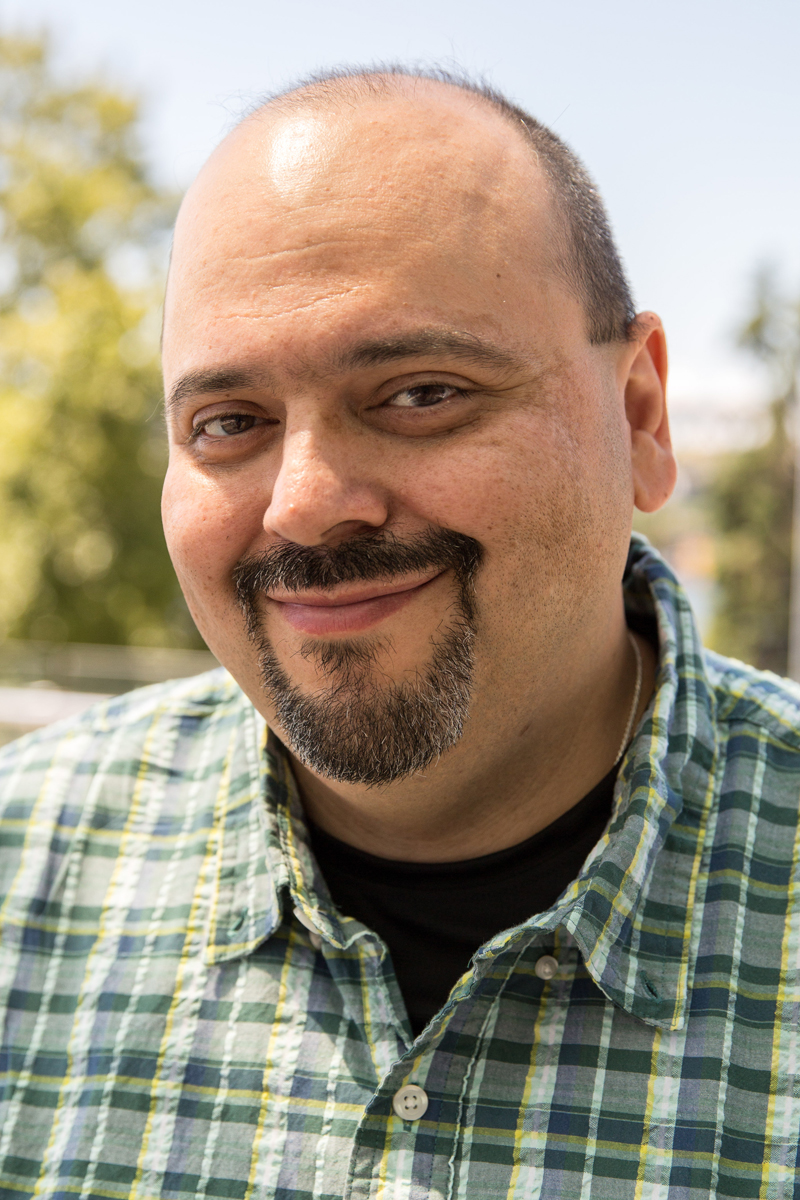
Jack McCrary lives about 25 miles north of the Arctic Circle in the primarily Inupiaq village of Noorvik, Alaska. At this time of year, the mosquitoes are out and they’re huge.
“What freaks me out about the mosquitoes is you hit them, they bounce back and fly off,” says John.
When John first moved to Alaska in 2012 from Oklahoma, he went out into the bush working for law enforcement. His mother had been a licensed practical nurse, so John had always interested in medicine. When the law enforcement job changed, he transferred over to the Alaska Community Health Aide program where he’s served as a community health aide in Noorvik for the past three years prior to MEDEX.
Working in a rural Alaskan community of 700, John would sometimes hit the limit of his scope of practice as a Community Health Aide. This was especially true in emergency medicine situations.
“We’d do the basic, simple stuff via standing orders,” he tells us.
Anything more complicated required consult with a higher-level provider—often a PA or NP. Sometimes in an emergent situation with limited resources, they were unable to get the patient medevaced in a timely fashion.
“I’d watch a patient lay there and suffer, knowing that more could be done if I had that training. That was a really big motivator for me. It’s the reason I’m here.”
With enhanced skills as a physician assistant, John expects to return to his community with some clear advantages.
“Right now, if somebody needs to see a mid-level or a higher provider, we have to ship them out on an airline flight to the regional hospital. That’s very taxing, especially if you’re not feeling well. So, my big hope is to dramatically lower the number of people we have to send out for the relatively minor things.”
John lives in Noorvik with his wife and two daughters.
“My oldest just had a birthday, so they’re 12 and 9 years old.”
As he’s here in Seattle with the entire 2019 incoming MEDEX cohort for a total of six weeks, John finds the Pacific Northwest summer temperatures a bit elevated.
“I’m adverse to hot,” he says. “But I’ll survive. I’m just really happy to have this opportunity to improve the level of care in the communities I serve.”
Nate Saltzgiver—Anchorage Class 11
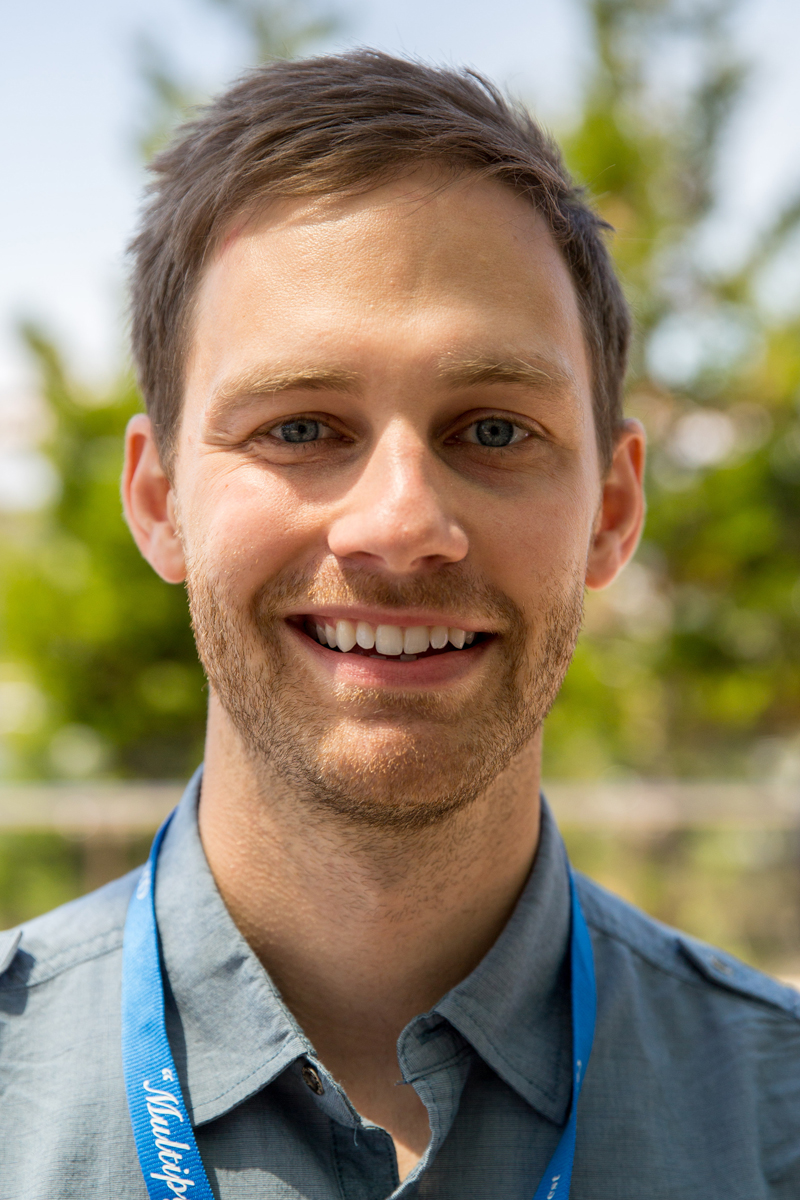
Nate Saltzgiver’s passion has always been the outdoors.
“Growing up in Alaska, either you love it or you don’t. And usually, if you love it, you love the outdoors. So that was me. And I thought, what’s better than wildlife? That’s the way to be outdoors as much as you can. I did a lot of different research projects with big mammals in the summers, and that was a lot of fun.”
With a bachelor’s degree in wildlife biology from Brigham Young University, Nate was set to enter a New Zealand-based master’s program in marine biology. However, these original career plans took a right turn. When the New Zealand program fell through at the last minute, Nate took a job with a buddy at a Provo, Utah plasma center as a phlebotomist.
“It was almost like a backdoor into medicine,” he says.
In truth, there are plenty of medical providers in his family. Nate’s sister-in-law is a nurse practitioner midwife, and then he has a sister and brother-in-law who are nurses.
“I was talking to them a lot,” he says.
After working as a phlebotomist for a year, Nate went on to become a medical assistant/scribe. For one year he worked for a PA who had gone through the MEDEX Anchorage program. For the past two years, he has worked for a family medicine MD, acting as both scribe and medical assistant.
“I like family medicine a lot,” he says. “I don’t know how much I like all the paperwork that comes with family medicine though. It seems to cause a lot of burnout. But I do enjoy the urgent care emergency medicine part. In Alaska, there are a lot of small clinics because of how spread out people are and everything. They do a lot of primary care with walk-ins that can actually be considered urgent care. It’s the combination of both that draws my biggest interest.”
Now a part of MEDEX Anchorage Class 11, Nate will move his wife and child from Salt Lake City, UT to Anchorage, AK.
“I want to be in Alaska,” he says. “So long as the winters don’t scare my wife. I mean, Utah gets good winters too, so I think it’ll be okay. Her dad wants us to stay in Alaska so he has a place to fish. So, yeah, I think there’s a strong pull to stay in Alaska.”
Looking back on his aspirations for a career in wildlife biology, Nate recognizes that life didn’t pan out that way. “Instead, it went this way. And I love it. I can still do the outdoor stuff on my free time. So that part will never change. But I like medicine a lot.”
Tom McArthur—Anchorage Class 11
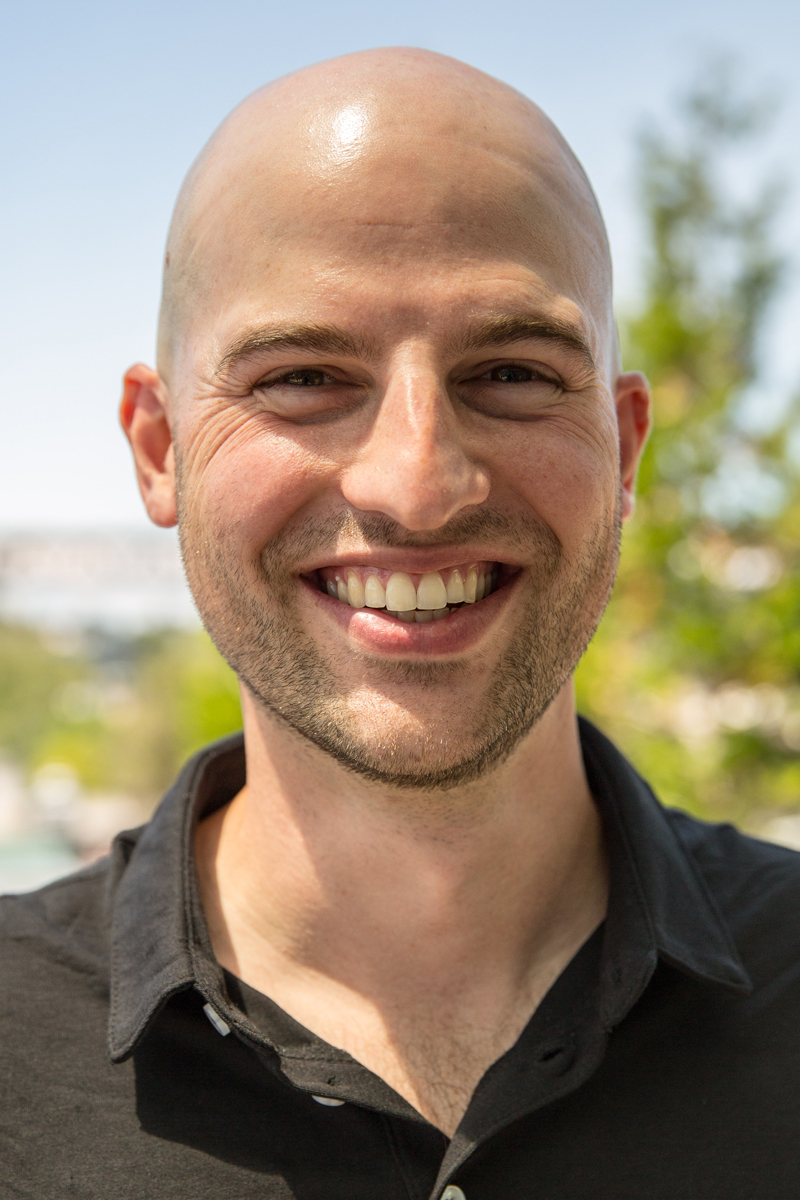
Currently a part of Alaska Air National Guard Pararescue, Tom McArthur has seen a lot during his years with the military. Just a few weeks ago, for instance, he flew 390 miles from Nome and picked up a man that was attacked by a bear.
“And we got him on the helicopter,” Tom says. “There were three of us working on him, but I was his primary medic. We flew him to JBER (Joint Base Elmendorf-Richardson), transferred him to another helicopter and brought him into the Providence Hospital.”
On that particular mission, two teammates skydived in ahead by 30 minutes to rescue the injured man. “I was on the helicopter, but it depends what aircraft you’re on for the day,” he says. Tom then arrived on the scene with his team leader.
“We were able to get him packaged up and get him out of there. That’s just one of the most recent rescues. We do land, sea, mountains, anywhere.”
Raised in Atlanta, GA, Tom joined the US Air Force at age 18. Five years ago, he learned about the MEDEX Program. “I read the mission statement and discovered what the school is all about.” He thought it was a match to his beliefs about how he wants to serve through medicine.
Tom applied to MEDEX Northwest so he might be better at medicine and help people in a different capacity. “I was an EMT as a rescue swimmer in the Coast Guard,” he says. “Now I’m a paramedic with advanced trauma training. And as a pararescueman, I want to further my education and work as a physician assistant.”
Although he’s most familiar with emergency medicine, Tom is intrigued by primary care.
“That’s the stuff I haven’t really worked in,” he says. “In underserved populations, you don’t always have an ER there. I want to get that primary care experience to be able to understand how to help in those remote areas where a doctor’s farther way.”
Given that he’s still active in the Alaska Air National Guard, there’s a chance he might be called to duty during his school studies.
“If I’m standing alert and filling one of those positions on the C-130 or helicopter, then yes, I can get called away to go on a mission.”
After his six weeks of study at the Seattle campus, Tom will return to his home in Eagle River, 15 miles northeast of the Anchorage classroom. A very pregnant wife awaits him.
Seattle Class 53
Matt Howze—Seattle Class 53
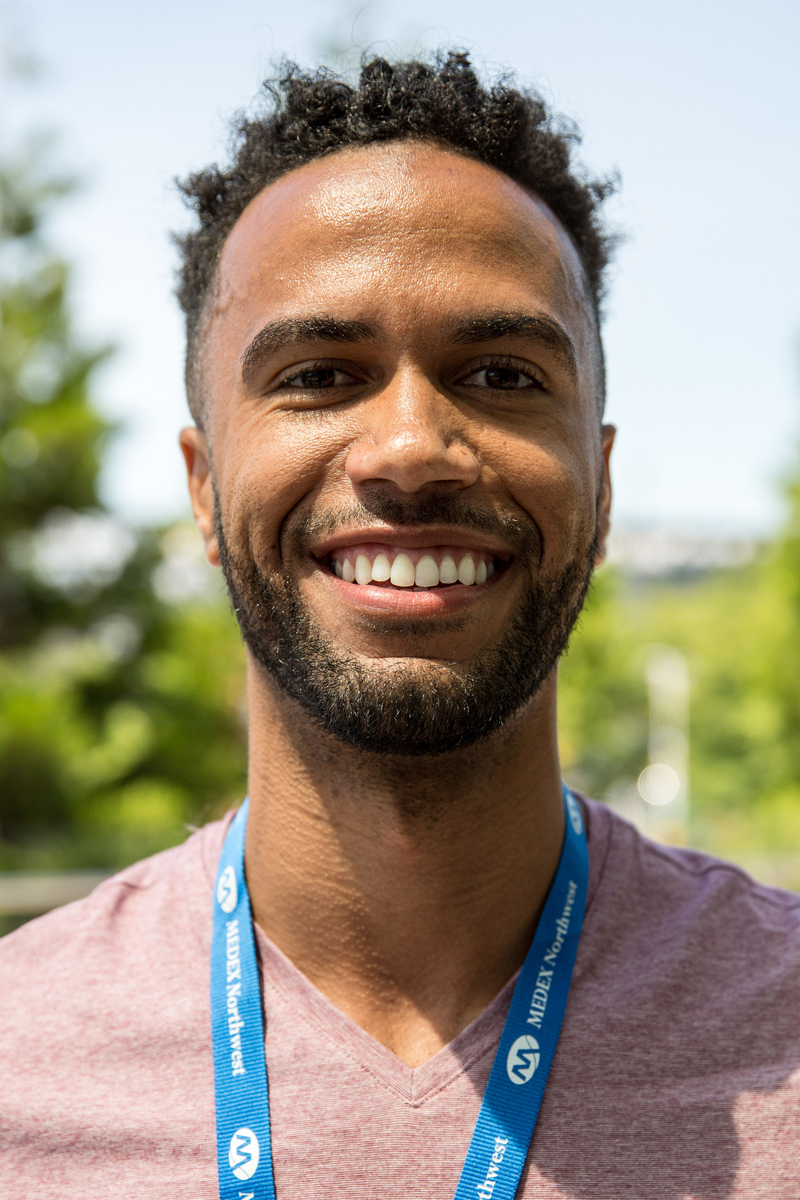
As a member of the 2nd Ranger Battalion at Fort Lewis, Matt Howze explains that everybody in the unit received a decent amount of medical training.
“I wasn’t a medic, but I was like my squad EMT,” he says.
During his undergraduate years at the UW, Matt pursued a degree in sociology. But his career path remained unclear. His thoughts returned to his military experiences, recognizing how much he enjoyed working in emergency medicine.
Fast forward and Matt has worked as an EMT with a private ambulance for three years. Most recently he was employed as an ER tech at Valley Medical Center in Renton, WA. Now he’s studying to become a physician assistant as part of MEDEX Seattle Class 53.
“I wanted to shoulder more responsibility and be more involved with patient care,” he says of his decision to become a PA. “Working as an EMT, you show up and do very minor care, and then you move on. I want to be more involved with diagnosing and the critical thinking that goes with managing patients. I thought that I could give back to the community more as a PA than an EMT.”
Looking ahead, Matt thinks he’ll remain in emergency medicine.
“It’s what I’m comfortable with,” he says “It’s what I’m familiar with and it’s exciting, you know. It’s nice not knowing what you’re going to see every day. The change of pace is really important for me.”
As a PA in emergency medicine, Matt thinks he’ll be able to reach more of the population.
“I’ll be able to affect more change and help more people. I’ve always just tried to be the best that I can.”
Matt believes his bachelor’s degree in sociology will come to good use as a PA.
“I think it’s beneficial to this field of work,” he says. “If you’re working with people, you’ve got to be able to put yourself in their shoes and understand that the path you took isn’t the same path that everyone else took. People don’t see things the same way. Empathy is one of the most important things about working in healthcare.”
Mitch Morgan – Seattle Class 53
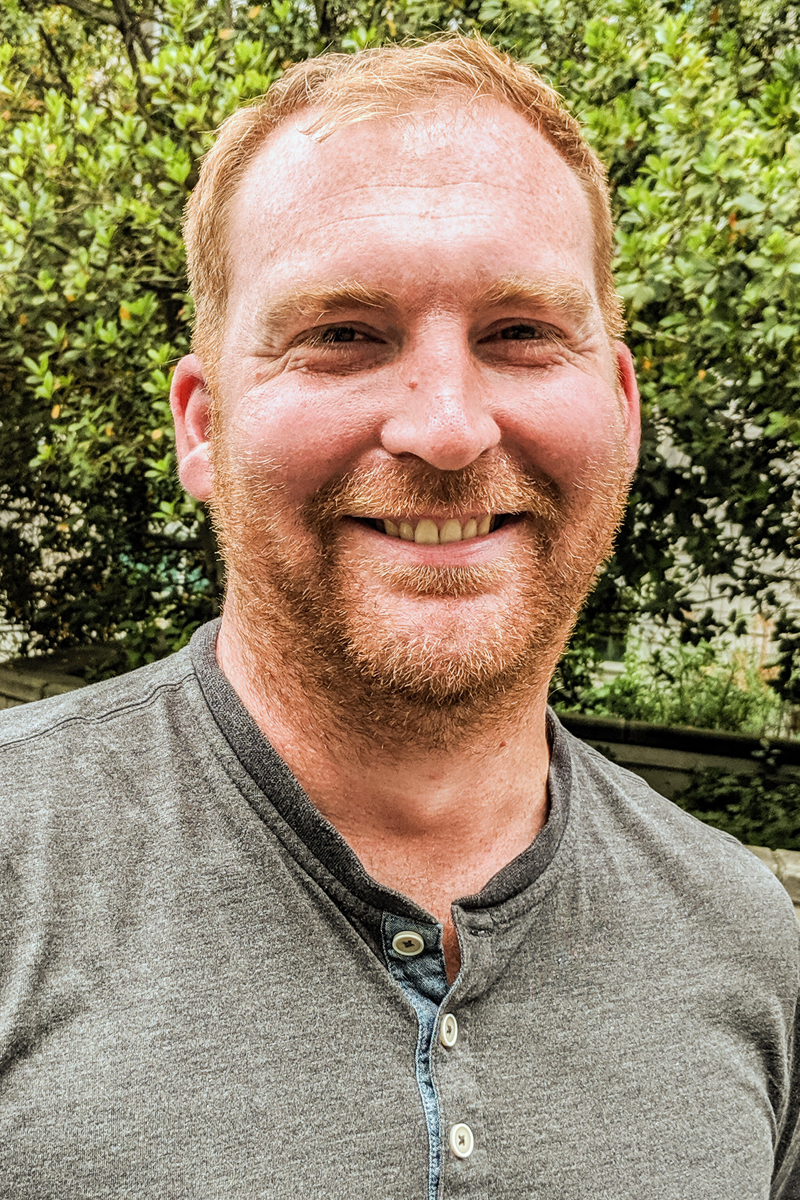
Growing up in Marysville, WA, Mitch Morgan viewed his options as either college or work. At age 18, he decided on a third option and joined the US Army.
“I thought the military might be a good choice where I wouldn’t need to grow up immediately. And I was kind of right, kind of wrong.”
Even in the service, Mitch was unclear about what he wanted to do. In order to appease his parents, he chose the medical field and became a medic. “That opened up a lot more possibilities further down the road as I grew older.”
In 2006 he was deployed to Iraq and worked in a hospital, on the streets, and in a detention facility. “I got to do a bit of everything,” he says. “A little geriatric care and a little emergency medicine.”
There were two additional deployments over the years as a Forward Observer, an artilleryman supporting forward-deployed units with air and artillery support. “I said, ‘Oh, I love maps. I love hiking, let’s do it.’” Mitch returned to Iraq in 2009/2010 with a tank unit and then went into Afghanistan 2012 with an infantry unit. These deployments all carried danger but Mitch enjoyed that.
On his second deployment to Iraq, Mitch met his wife-to-be. And as they got more serious, he realized that he couldn’t make a career out of the military.
“Afghanistan was my last trip, and I knew it was time to hang up my boots.”
Mitch started looking at his options and learned about the MEDEX physician assistant program. There were requirements that had to be met for entry. “Okay, I need a bachelor’s, I need science classes. And so I reached out to University of Washington Bothell campus.” Even while overseas with a minimal internet connection, he was able to arrange his college education. When he came home from Afghanistan, Mitch had a spot in college two months later.
He got a biology degree. By that time, it had been a few years since Mitch practiced medicine in any capacity. He attended North Seattle College and got his EMT license.
In part to acquire the necessary patient hours for admission to MEDEX, Mitch worked at a homeless shelter in South Lake Union for three years. “Primarily alcoholics, mental health, and heroin, meth, cocaine use—the really underserved of the Seattle area,” he says. “This is something I became very familiar with. And that’s what made me a well-rounded candidate for MEDEX.”
Mitch is clear that, upon graduation and certification as a PA, he’ll work within his community in Snohomish County. “There’s a lot of work to be done out there and a huge need,” he says. “They’re facing a critical level of crisis with meth and heroin. I’m on that tide where I’ll be in a position to really create some progress there. That’s where my grandfather grew up, and that’s where I’d like to raise my kids.”
Phoebe Bryson-Cahn—Seattle Class 53
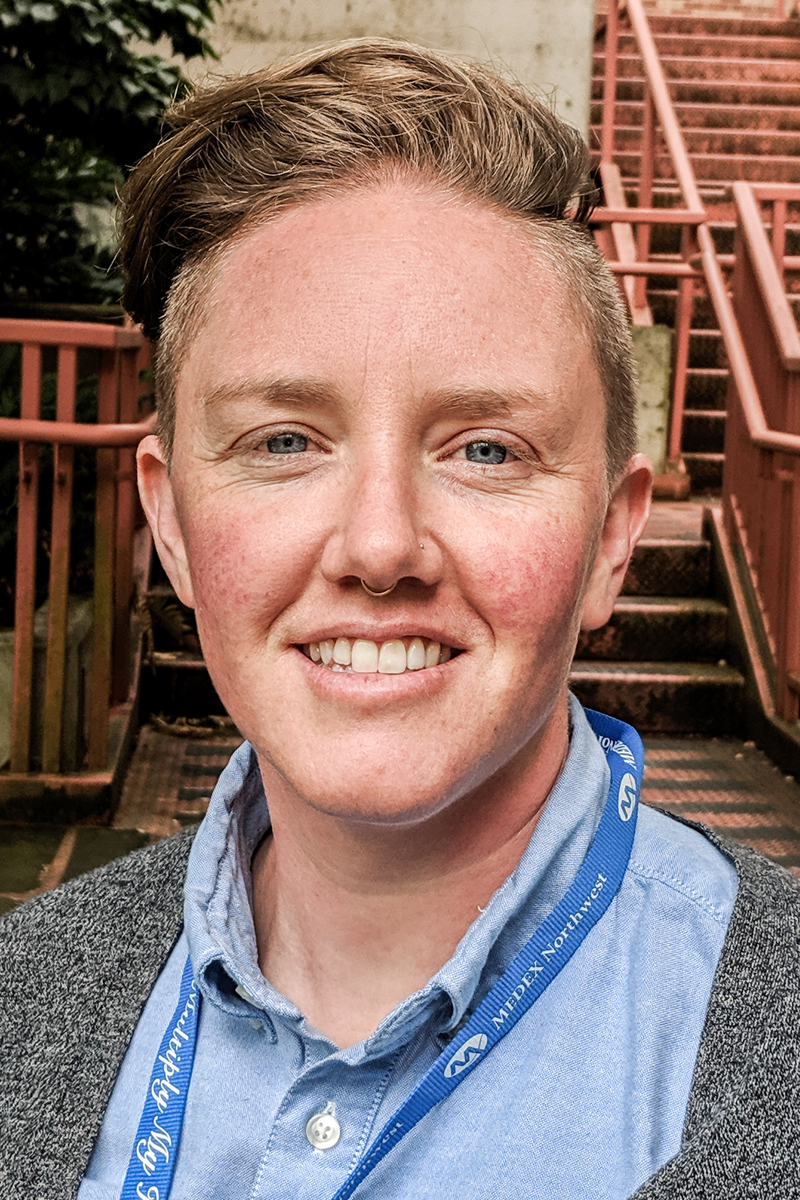
With a hyphenated last name, Phoebe Bryson-Cahn prefers the abbreviated version of B.C.
“It’s my two parents’ names,” Phoebe explains. “I give them a lot of smack about it because it’s a long name and people are constantly misspelling it or there’s no place for a hyphen. Like on Southwest Airlines, you can’t put a hyphen in your name. Someone once told me that they think that the divorce rate is very high amongst parents that have hyphenated their children’s names because it represents an inability to compromise. My parents are divorced, so it’s anecdotal evidence.”
Growing up in Berkeley, CA, the notion of medicine always sat in Phoebe’s mind. True, there is a sister who is a doctor. But early on that became not an option because that’s the route the sister took.
“I worked in the outdoor industry guiding trips in the mountains. And so, I would get my Wilderness First Responder recertification every few years and I was always very excited by the material. That kind of planted the seed in the back of my mind.”
All told, Phoebe guided for about five or six years.
“It’s very seasonal once you’re in the outdoor industry, especially in the kind of work I was doing. So mostly backpacking, and rock climbing, and hiking trips. Offseason I was a ski bum. I’d go to different ski resorts—Durango, Colorado one winter and I worked at Squaw in Tahoe for another winter.”
It was a personal medical emergency that pushed Phoebe in the direction of pursuing medicine.
“I was diagnosed with a brain tumor after having a seizure. And that kind of thrust me into the world of medicine, whether I liked it or not. And I figured out that I liked it, once I was in there. A really good family friend of mine went to PA school at USC. And through my treatment, I met PAs in the hospital as well. So, after my surgery and my recovery, I decided that I wanted to start working towards becoming a PA.”
Phoebe got a job as a medical scribe in a urology office located three blocks from home.
Eventually, Phoebe linked up with that physician sister who had just received a fellowship in Seattle. Together they moved to the city where Phoebe found work as a scribe with NeighborCare Health, a family medicine community health clinic. That was three years ago.
“Through NeighborCare and my general set of values, I am very passionate about underserved populations. That’s part of the MEDEX focus that inspired me to come to this program.”
Spokane Class 23
Aida Keshavarzrahbar—Spokane Class 23
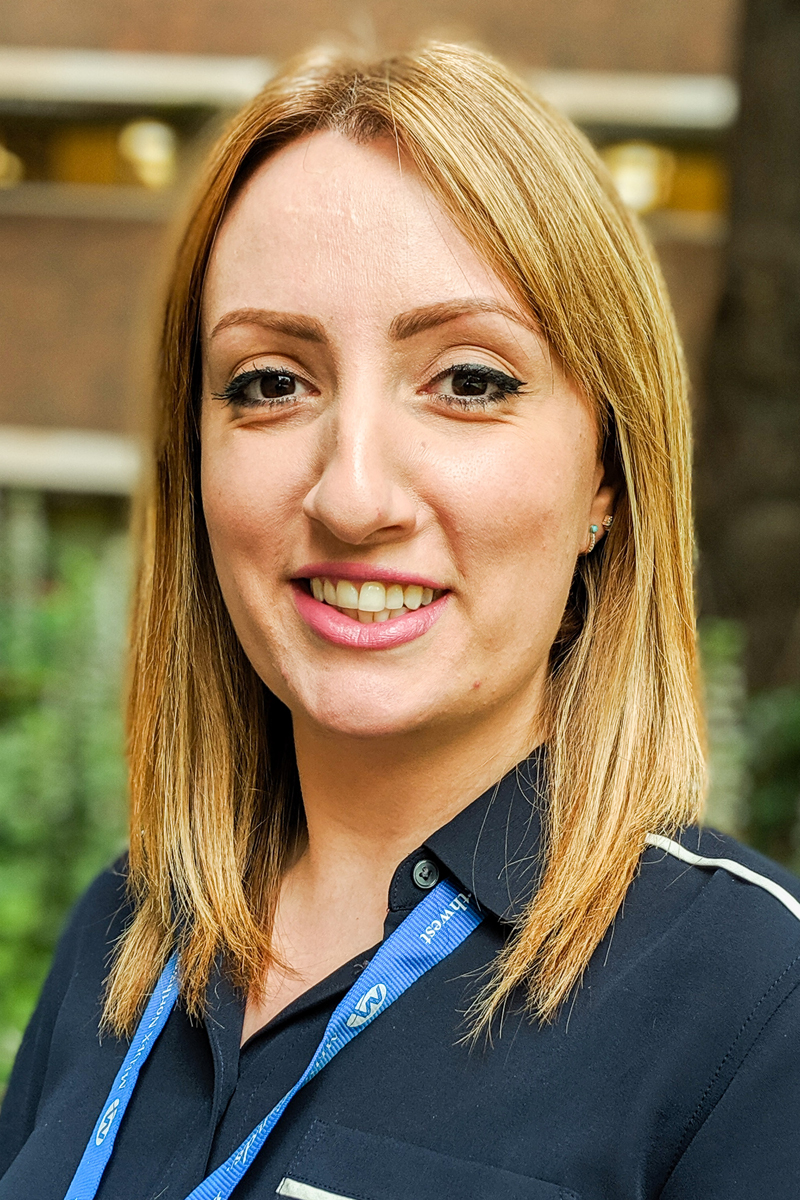
An immigrant from Iran, Aida Keshavarzrahbar left her home country because her religion presented an obstacle to higher learning.
“Bahais are not allowed to attend universities in Iran,” Aida says in perfect English. “There’s a lot of discrimination against Bahais in Iran, and it’s ongoing. My family planned to move somewhere else where we could continue our education.”
By the age of 20, Aida had gone as far as she was allowed in the Iranian school system.
The family’s immigration path included an initial stop in Turkey, where they stayed for 11 months in order to obtain their U.S. visas. They arrived on U.S shores in 2008.
“I always wanted to be in the medical field,” Aida tells us. Aida’s father died of a heart attack at the early age of 48, which proved to be a major factor in her developing interest in medicine.
“I had some friends that gave me advice and taught me about different areas of medicine. I decided to go into radiology.”
Aida got her associate degree in radiology from Wenatchee College, followed by a bachelor’s degree in radiology sciences from Bellevue College. She was cross-trained in CT and MRI, and worked as a CT tech at Overlake Hospital for five years.
“I loved it a lot more when I started working in X-ray,” she says of her time at Bellevue Medical Imaging.
At Overlake, Aida worked side-by-side with several PAs. Before long she decided this was the right path and to continue her education as a physician assistant. She applied to MEDEX with Spokane as her campus choice.
“MEDEX is one of the best schools. It was number one for me and I’m so happy and honored to get in. So, yeah, it was my first choice.”
We ask Aida where she’d like to end up in medicine.
“I think I’m just going to be open to any opportunity,” she says. “You know, I’m not going to decide something right now because I feel like things can change a lot as we do our clinicals. Everything can change. So, I’m just going to keep an open mind and go with what’s right for me.”
Heather Labbe – Spokane Class 23
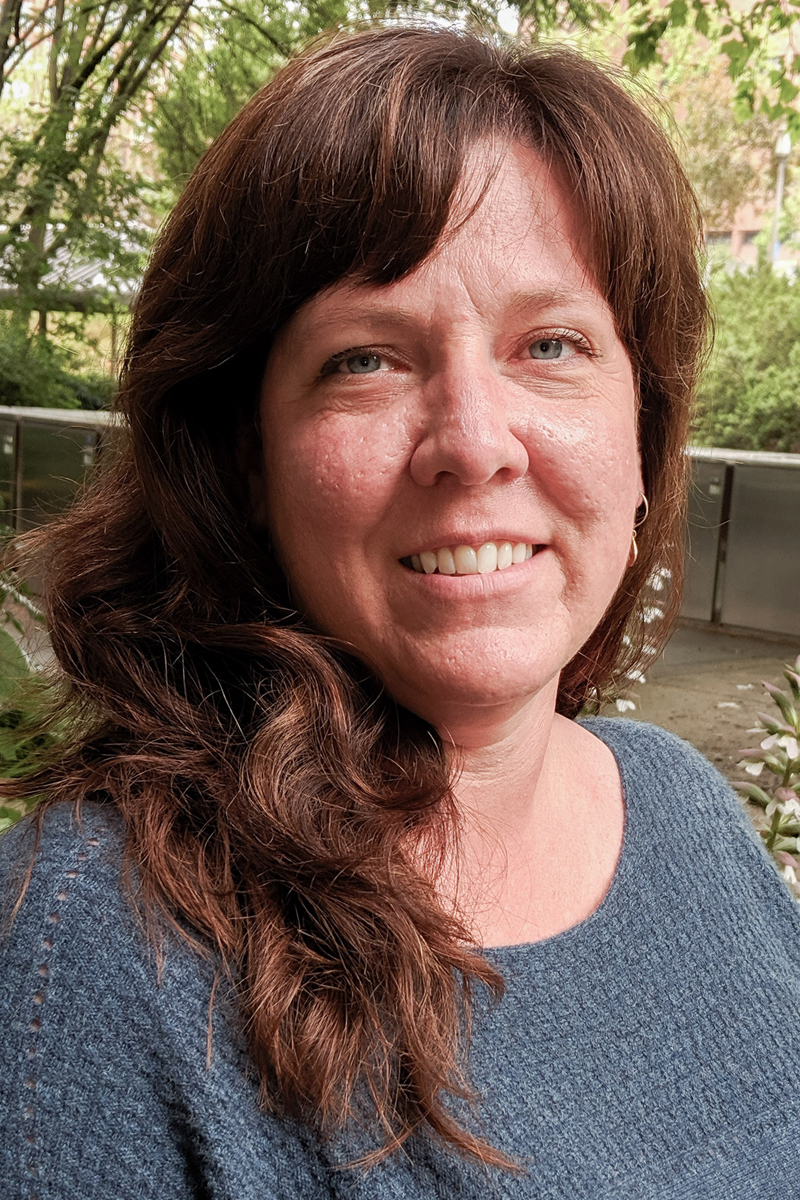
Heather Labbe makes her home in Missoula, Montana, and she’ll soon be taking up residence in Spokane for the duration of her PA education. But right now, she’s secured a dorm room on the UW campus for the 6-week length of her all-cohort classroom sessions at the start of her PA education.
“At 44 years old I never really thought I could get that happy about a dorm fridge, but I got my dorm fridge yesterday,” she tells us. Now all she needs is a coffee maker and dorm life will be grand.
Heather is very familiar with aspects of medical education.
“I taught anatomy and physiology to undergraduates at the University of Montana for years,” she says. “I worked in a physical therapy school and also taught professional graduate students in UM’s School of Physical Therapy and Rehabilitation Science in the DPT program for a year. I spent 15 years having students come and go from my classrooms who were all bound for the medical fields in various aspects. I always looked longingly towards them moving on into their various professions, wondering what it was like.”
Twelve years ago, Heather decided to take her first step into healthcare-related fields. She trained and got a job as an EMT in Missoula.
“I worked as an EMT in a private ambulance service in Missoula and really fell in love with patient care. I decided that I was at a point in my career that it was a good time to take the step into PA training, so here I am.”
A&P is Heather’s comfort zone. “But I know I’m going to be pushed out of that real quick,” she says. “I’m looking forward to more of the pathophysiology, the patient care and clinical aspects.”
Over the years, Heather saw many of her students go into the MEDEX program. “People that I worked with at the ambulance went into MEDEX and spoke really highly of the program. I’ve actually seen them working as PAs now in Montana and have been really impressed with their skill set and proficiency levels. So, I wanted to come here. It was my first choice.”
After graduation and certification in 2021, does she see a future for herself in emergency medicine?
“Even in the brief time that you encounter a patient in the back of the ambulance,” says Heather. “You want to hope that they’re going to have a positive outcome. That’s something you just really don’t get as an EMT. We see people at their worst moments and we’re not able to follow up. That actually is something that drew me to becoming a PA. I do like family medicine, but I also am drawn to specialties like neurology. Having long-term relationships with patients is pretty attractive to me. So that’s something I’m really looking forward to exploring in my clinical year.”
Mason Vegas—Spokane Class 23
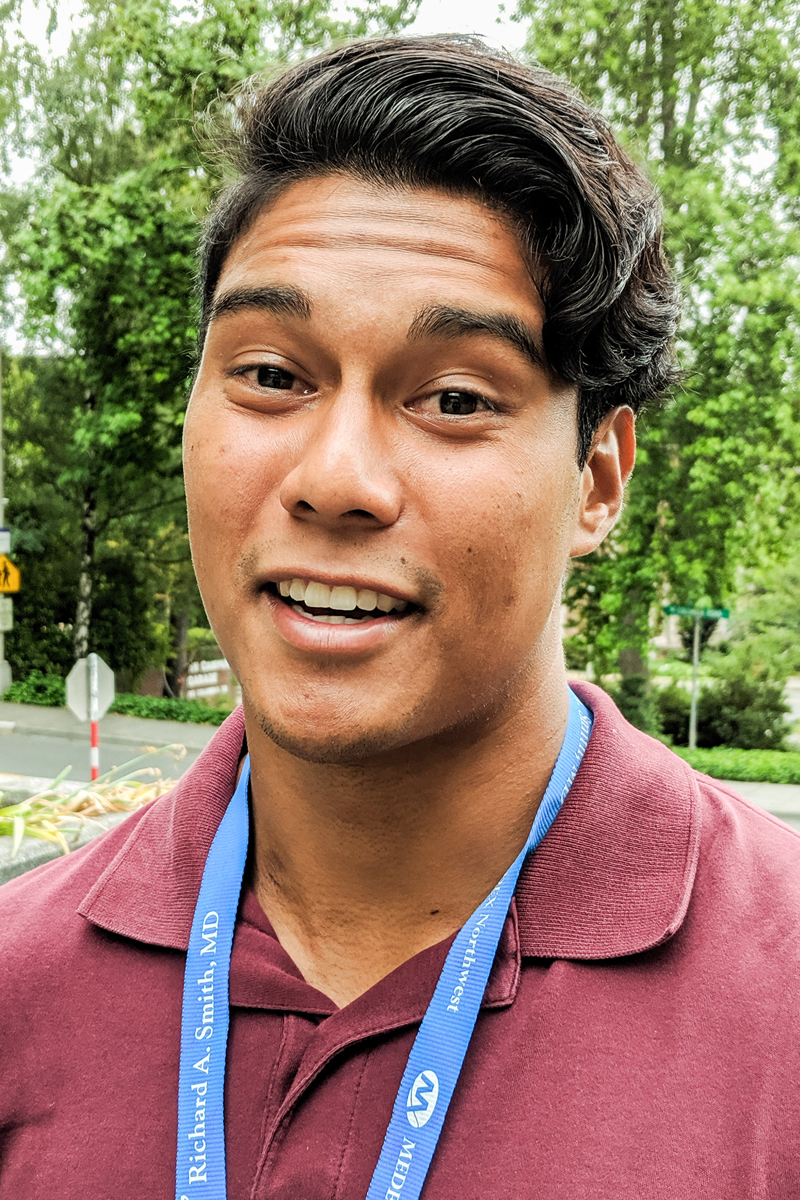
Growing up on the Hawaiian island of Kauai, Mason Vegas played soccer in high school.
“I had a lot of injuries and was exposed to orthopedics, doctors, and PAs,” he says. “The medical field just started to interest me. Add to that a kind of the deprivation of healthcare services on the island.”
On Kauai and across the island chain there is an absence of sufficient providers. Turnover rates of doctors are high, largely because the cost of living is so outrageous. For many providers, there’s the lure of more financial opportunity on the “mainland” United States.
As a Hawaiian native, Mason knows the healthcare needs of the population. There’s a lot of non-compliance concerning chronic illnesses.
“You can have patients with some sort of chronic medical issue that don’t come in to be seen for months. I know of a lot of people up on the North Shore side of the island. They’re so far from medical resources that, if they cut themselves with a knife or something like that, they’re stubborn enough to not come in to be seen until the wound is infected to a point where antibiotic treatment is the only way to cure them.”
Mason admits that it plays into stereotypes, but many people from Hawaii don’t like to be seen by providers from the mainland.
“That’s the reason I want to move back home one day,” he says. “The knowledge I learn here at MEDEX can make an impact on their lives medically.”
Mason has been living and working in Spokane for the past seven years as a certified medical assistant for a Providence-based residency facility called the Spokane Teaching Health Clinic.
“Honestly, I felt like the medical field was calling my name,” he says. “I shadowed a lot of doctors and PAs to figure out the route that I wanted to go.”
It’s the teamwork approach so common in environments with physician assistants that led Mason to PA school.
“I feel like I was put on this earth to help people,” he says. “I just had to find a route where I would be able to do that. And honestly, the medical field was calling my name. My ultimate goal is to give back to the community and provide those medical services to people back home in Hawaii that don’t have it. It’s important to be on the same page as they are. Being able to speak the common slang to patients means they become a lot more comfortable with me and, hopefully, comply with the care that I provide.”
Returning to Hawaii is high on Mason’s list. But after he’s done with the MEDEX program, he plans to work in the mainland for a little longer. “I want to build up that knowledge base first as a physician assistant.”
Tacoma Class 7
Katharine Ishida—Tacoma Class 7
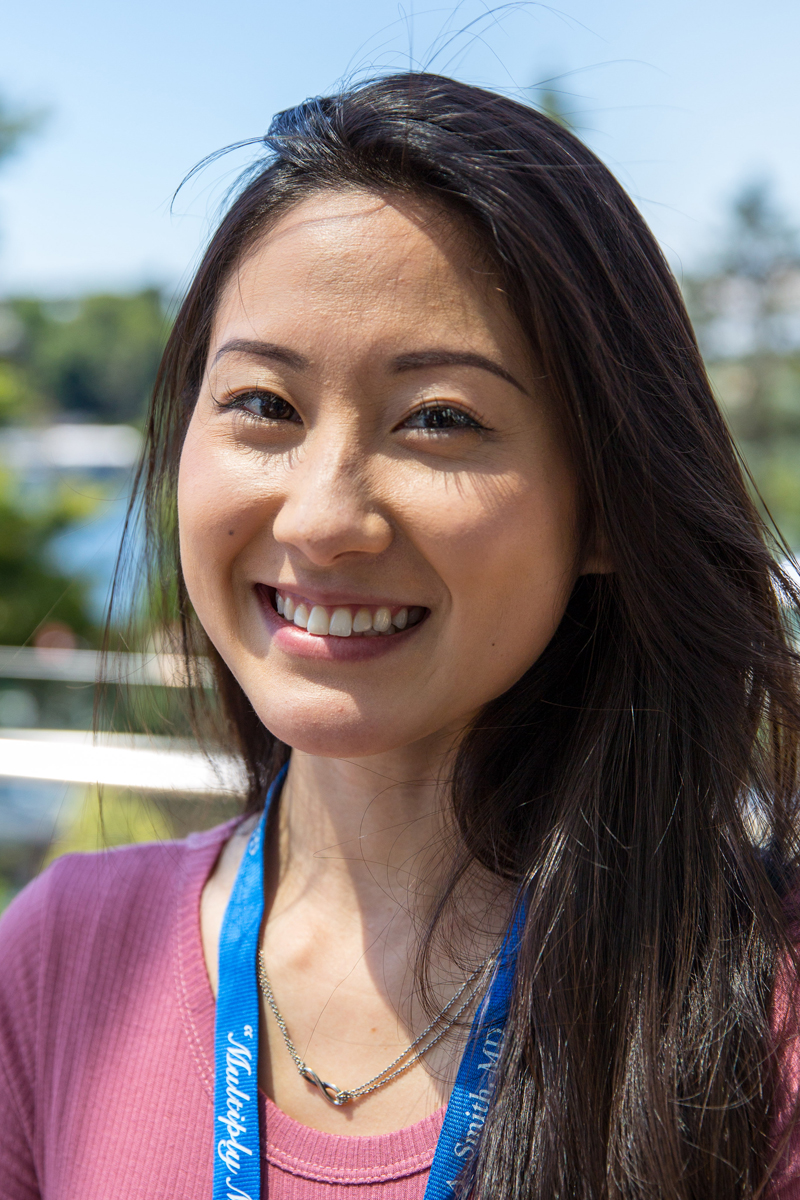
Katharine Ishida worked for two years as a physical therapy aid in San Diego, California before becoming a medical assistant. This afforded her a unique opportunity to become a civilian working aboard the USNS Mercy hospital ship.
“I volunteered as a civilian physical therapy aide, and got to work alongside Naval Reserve physicians, PAs, and healthcare professionals who served in the Air Force and military,” she tells us.
The mission was to provide humanitarian assistance to Southeast Asia, specifically Malaysia and Indonesia. “Those countries are very conservative and Islamic, so I was able to see the importance of being able to serve people from different religions in a culturally competent manner.”
It was the emphasis on diversity that attracted Katharine to MEDEX.
“They really emphasized serving diverse communities, especially throughout the WWAMI regions. I’m interested in being able to work with people who are different from me culturally. I think it’s important to embrace differences and provide for people who are different from what I’m used to.”
Although deeply rooted in LA, at this early stage in her career Katharine has an open mind about where she might want to practice as a physician assistant.
“My parents are immigrants from Japan and I grew up watching them struggle to learn English as a second language,” she says.” I would love to go to a place with a large immigrant population. Because of my personal background and my family, I really empathize with patients who speak different languages or come from different cultures.”
Mariah Christopherson—Tacoma Class 7
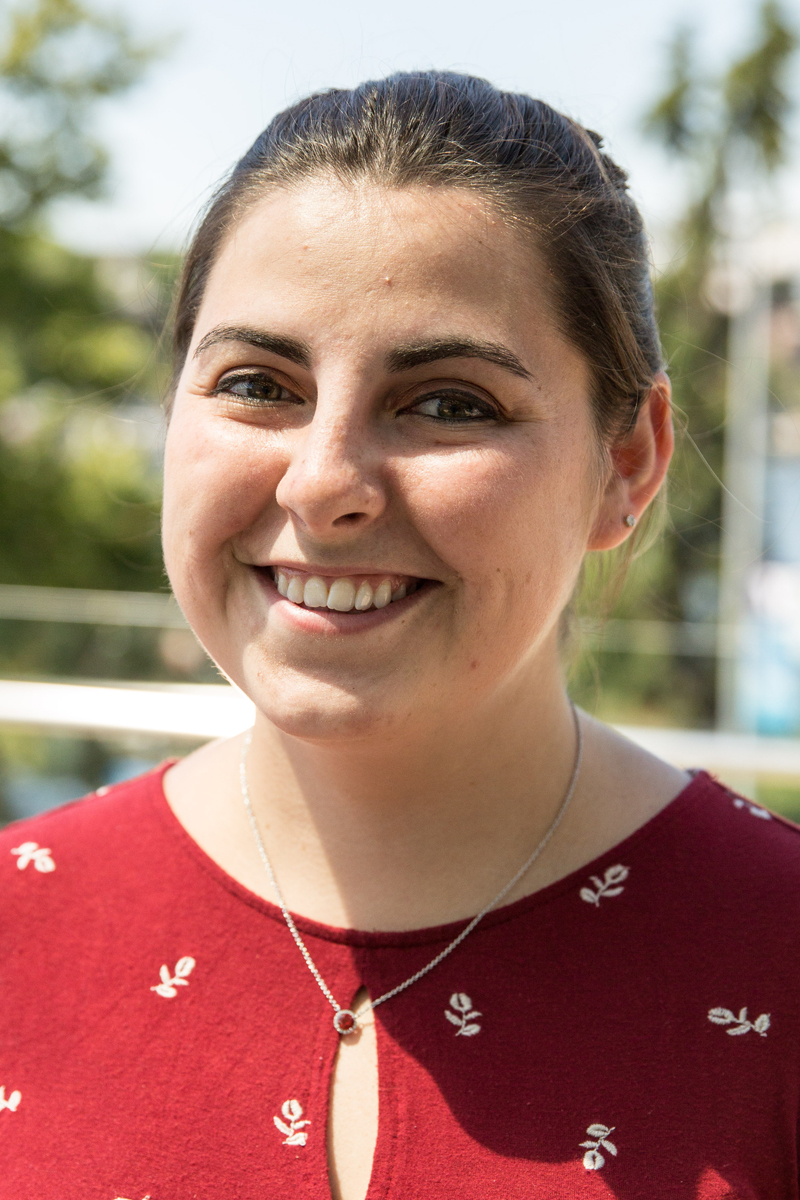
Mariah Christopherson grew up on the Lake Traverse Indian Reservation in Sisseton, SD.
“I grew up on the rez and so had the pleasure to receive most of my healthcare from the IHS (Indian Health Service) system,” she says. “I’ve really only received all of my health care from clinics and critical access hospitals.”
Mariah reports that among the challenges of being a patient in that environment are rotating clinicians.
“It’s hard to have the continuity of care because you’re almost always seeing somebody different,” she says. “After MEDEX I really hope to go back to South Dakota and work for IHS in some capacity. And when I find where I want to work, I want to stay there and work for my community and be a clinician that provides continuity of care. That’s when you are able to work with your patients on preventative health care, which is really important to me. That’s the future goal.”
Mariah has been an EMT for a rural town of 200 people, a direct support professional for individuals with mental illness, and worked as an ER Tech/CNA at a 25-bed hospital in Breckenridge, Minnesota.
Because of earlier experiences, Mariah was really looking for a PA program with an emphasis on serving underserved populations. She applied to two other programs that were closer to home.
“But I also wanted to get out of the Midwest,” she adds. “Reading the MEDEX mission statement really clicked with me. I feel like this program chose me. I didn’t think it was going to happen.”
Mariah expresses amazement at all the trees in Seattle. “We don’t have those in South Dakota,” she adds.
When told that the green in Seattle comes at the cost of incessant winter rains, she responds, “Well, I can deal with the rain as long as it’s not negative 40.”
Shinsung Yook—Tacoma Class 7
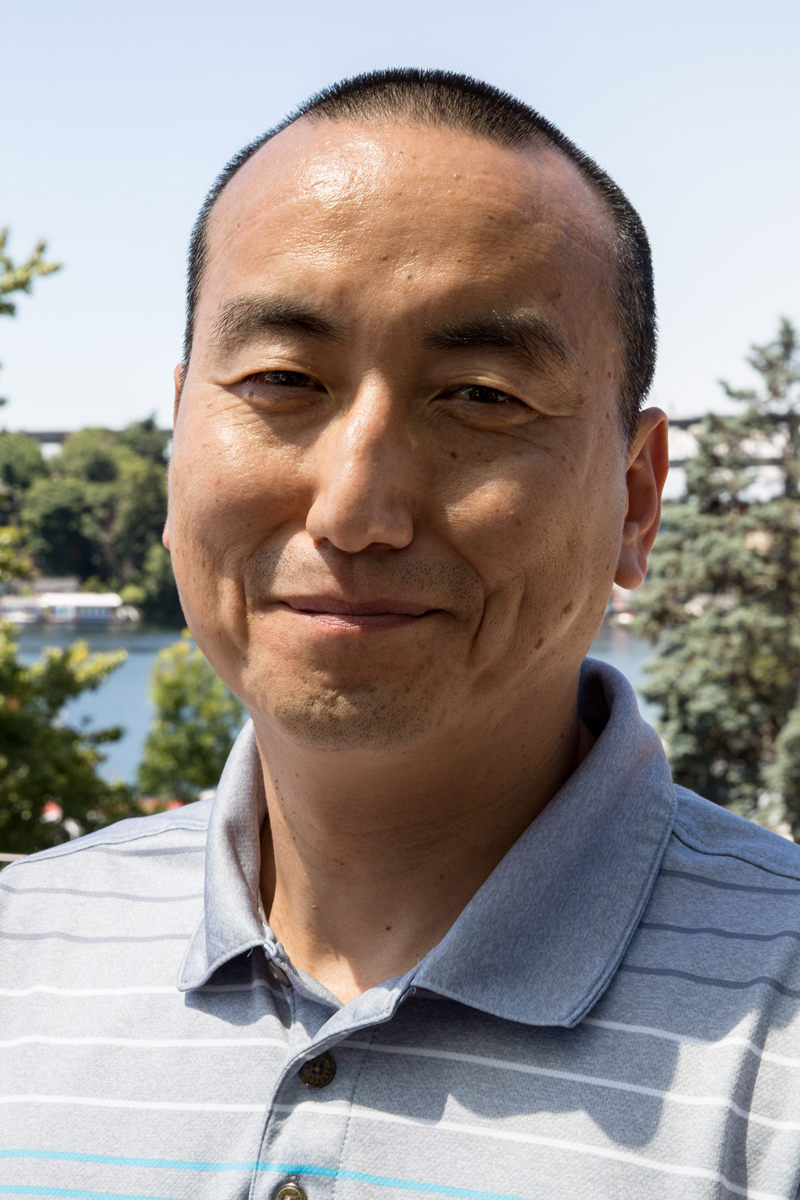
In 2005 Shinsung Yook immigrated from Korea to the U.S. With no formal medical background, he joined the U.S. Army in 2010 as a health care specialist, also known as a combat medic.
“I wanted to utilize my medical knowledge, skills, and experiences I acquired during my service. Thus, I was interested in becoming a PA,” he says. “It was a little bit harder for me to adapt to American culture because I had lived in Korea all of my life. But I met a lot of good soldiers during my service. They helped me a lot, so I love the Army.”
Stationed at JBLM (Joint Base Lewis McChord), Shinsung was interested in IPAP, the military PA education program. “Unfortunately, I wasn’t eligible for the program because of my age. IPAP requires me to be commissioned before the age of 42. I was 46 years old. So, I looked to the PA program at MEDEX. I submitted my application and was then selected to enter this program in 2018. I really appreciate the school giving me this great opportunity.”
As he begins his PA studies this year, Shinsung has moved from military to civilian life. Still, he hopes to work for the Army after graduating from MEDEX.
“I’m not sure the Army is going to accept me because of my age. But I’m still interested in coming back to the Army.”
“Coming to America changed my whole life,” he says. “I really appreciate America. I also appreciate the Army for allowing me to join at 38 years old.”
